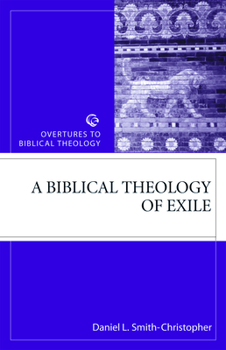Biblical Theology of Exile
(Part of the Overtures to Biblical Theology Series)
Select Format
Select Condition 
Book Overview
The Christian church continues to seek ethical and spiritual models from the period of Israel's monarchy and has avoided the gravity of the Babylonian exile. Against this tradition, the author argues that the period of focus for the canonical construction of biblical thought is precisely the exile. Here the voices of dissent arose and articulated words of truth in the context of failed power.
Format:Paperback
Language:English
ISBN:0800632249
ISBN13:9780800632243
Release Date:August 2002
Publisher:Fortress Press
Length:224 Pages
Weight:0.70 lbs.
Dimensions:0.6" x 5.5" x 8.5"
Customer Reviews
1 rating
So are we exiles then?
Published by Thriftbooks.com User , 19 years ago
Building upon his The Religion of the Landless: The Social Context of the Babylonian Exile (Meyer Stone, 1989), the author has produced a thoughtful work on a central biblical concept that is both historical and theological. Works on biblical theology are almost compelled to begin with an apology for the method employed. Smith-Christopher does not fail to do so ('Biblical Theology: On Matters of Methodology', 1-26), signalling in his comment upon post-modern metaphysical critiques that he does not intend to allow a hyper-critical or hyper-sceptical critique to claim exclusive legitimacy in the conversation. While attempting to be critical of his own assumptions, Smith-Christopher is persuaded that both history and theology can be carried out with integrity, especially when focussing upon a discrete theme like exile. 'Discrete', however, does not mean `miniscule', for the author is convinced that one must see the exile of Judah not only as human catastrophe-its actual happening can be defended on historical grounds-but also as an event that engendered significant new social and theological enterprises. Smith-Christopher writes from his own participation in an historical 'peace church' and finds a promising correlation between the 'stateless existence' that was the destiny of the Jewish exiles and the kinds of church community that is praised by some Christian theologians. As a result, he is eager to question both Constantinian and Wellhausian views of 'exile' as an intrinsically negative socio-religious matrix that lost something essential. Nevertheless, Smith-Christopher is wary of seeing the experience or model of exile through rose-colored glasses, wanting with E. Said not to 'belittle its mutilations'. The author proposes reading exilic texts-it was after all a premier period for literary brilliance-'with the presumption of resistance, but not necessarily a resistance based on nationalist aspirations'. Contrary to recent trends, Smith-Christopher argues for the historical trauma and severity of the exile ('Violence and Exegesis: The History of Exile', 27-73). Against C.C. Torrey and his intellectual heirs, Smith-Christopher is convinced that the exile was a very big event indeed, not an insignificant incident that well served a political agenda that has been described more recently as 'the myth of the empty land' (Barstad, 1996). To the contrary, Smith-Christopher argues that the events were 'catastrophic and transformative for Hebrew existence'. Here Smith-Christopher comes to his original and exceedingly useful contribution: '(T)he impact of the Babylonian exile must make far more use of nonbiblical documents, archaeological reports, and a far more imaginative use of biblical texts read in the light of what we know about refugee studies, disaster studies, postcolonialist reflections, and sociologies of trauma' (emphasis mine). Smith-Christopher believes that evidence for the benign role of the Persian empire vis-à-vis its depende





